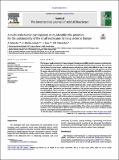Por favor, use este identificador para citar o enlazar a este item:
http://hdl.handle.net/10261/253420COMPARTIR / EXPORTAR:
 SHARE SHARE
 CORE
BASE CORE
BASE
|
|
| Visualizar otros formatos: MARC | Dublin Core | RDF | ORE | MODS | METS | DIDL | DATACITE | |

| Título: | A multi-stakeholder participatory study identifies the priorities for the sustainability of the small ruminants farming sector in Europe |
Autor: | Belanche, A. CSIC ORCID; Martín-Collado, Daniel; Rose, G.; Yáñez Ruiz, David R. CSIC ORCID | Palabras clave: | Dairy Goat production Meat Sheep production Sustainability |
Fecha de publicación: | 2021 | Editor: | Elsevier BV | Citación: | Animal 15: 100131 (2021) | Resumen: | The European small ruminants (i.e. sheep and goats) farming sector (ESRS) provides economic, social and environmental benefits to society, but is also one of the most vulnerable livestock sectors in Europe. This sector has diverse livestock species, breeds, production systems and products, which makes difficult to have a clear vision of its challenges through using conventional analyses. A multi-stakeholder and multi-step approach, including 90 surveys, was used to identify and assess the main challenges for the sustainability of the ESRS to prioritize actions. These challenges and actions were identified by ESRS experts including farmers, cooperatives, breeding associations, advisers and researchers of six EU countries and Turkey. From the 30 identified challenges, the most relevant were economy-related challenges such as ‘uncertainty of meat and milk prices’, ‘volatility of commodity prices’, ‘low farm income’, ‘high subsidy dependency’ and ‘uncertainty in future changes in subsidies’ resulting in ‘a sector not attractive to young farmers’. Most of these challenges were beyond the farmer's control and perceived as difficult to address. Challenges were prioritized using an index, calculated by multiplying the relevance and the feasibility to address measures. The identified challenges had a similar priority index across the whole sector with small differences across livestock species (sheep vs goats), type of products (meat vs dairy) and intensification levels (intensive vs semi-intensive vs extensive). The priorities were different, however, between socio-geographical regions (Southern vs Central Europe). Some of the top prioritized challenges were linked to aspects related to the production systems (‘low promotion of local breeds’ and ‘slow adaptability of high producing breeds’) and market practices (‘unfair trade/lack of traceability’). The majority of the priority challenges, however, were associated with a deficient knowledge or training at farm level (‘poor business management training’, ‘lack of professionalization’, ‘slow adoption of innovations’), academia (‘researchers do not address real problems’) and society as a whole (‘low consumer education in local products’, ‘low social knowledge about farming’, ‘poor recognition of farming public services’). Thus, improved collaboration among the different stakeholders across the food chain with special implication of farmers, associations of producers, academia and governments is needed to facilitate knowledge exchange and capacity building. These actions can contribute to make ESRS economically more sustainable and to adapt the production systems and policy to the current and future societal needs in a more region-contextualized framework. | Versión del editor: | http://dx.doi.org/10.1016/j.animal.2020.100131 | URI: | http://hdl.handle.net/10261/253420 | DOI: | 10.1016/j.animal.2020.100131 | Identificadores: | doi: 10.1016/j.animal.2020.100131 issn: 1751-732X |
| Aparece en las colecciones: | (EEZ) Artículos |
Ficheros en este ítem:
| Fichero | Descripción | Tamaño | Formato | |
|---|---|---|---|---|
| 2021_Belanche_A_OA.pdf | 1,47 MB | Adobe PDF |  Visualizar/Abrir |
CORE Recommender
Page view(s)
50
checked on 23-abr-2024
Download(s)
100
checked on 23-abr-2024
Google ScholarTM
Check
Altmetric
Altmetric
Este item está licenciado bajo una Licencia Creative Commons

